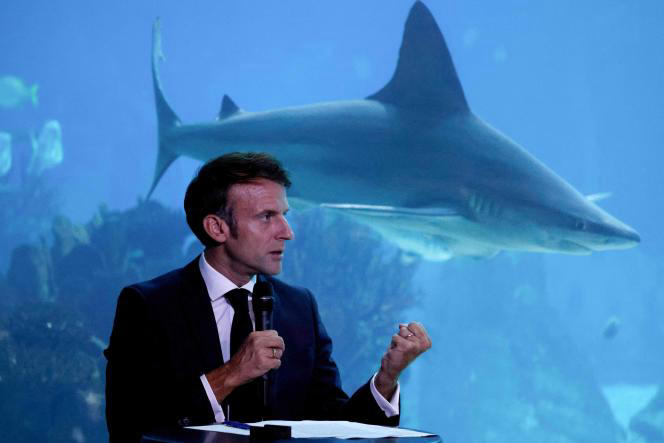Macron takes stance against deep-sea mining at UN Ocean Conference
The French president's statement in Lisbon on Thursday, 30 June came as a pleasant surprise to NGOs, which have been actively seeking a moratorium on the search for mineral resources in the deep sea.
Subscribers only

Deep-sea exploration and exploitation were not on the agenda for the official discussions of the United Nations Ocean Conference held in Lisbon until July 1. But the issue was largely at the forefront of these international meetings, until President Emmanuel Macron's short but resounding statement on Thursday, June 30: "I think we need to develop a legal framework to put a stop to deep-sea mining in international waters and not authorize new activities that would endanger the [ocean] ecosystems." The French president pleasantly surprised environmental NGOs with this statement. Until now he had appeared to be interested in exploration for cobalt crusts, sulfides and polymetallic nodules in the deep sea.
The discussion he had with highly respected oceanographer Sylvia Earle may have played a role in this position, adopted not before the plenary session, but at the Oceanarium in Lisbon in front of a tank where sharks were passing by and in front of an audience of about 40 major figures from the maritime academic world. At the opening of the UN meetings, the pioneering former scientific director at the US National Oceanic and Atmospheric Administration (NOAA) stressed that the mining industry is plagued by environmental impacts everywhere it goes. Ms. Earle wondered, "On land, we can at least monitor, see and solve the problems, and minimize the damage. Six thousand meters below the surface, who is watching?"
Since France has the second-largest maritime territory in the world and its president has presented himself as a champion of the defense of the marine world – he has offered to host the next UN Ocean Conference in 2025 jointly with Costa Rica – Paris was expected to have a strong presence. The pressure to obtain a moratorium protecting the ocean depths against industrial exploitation has increased again in recent days. Environmental NGOs, which are very active on this issue, as well as many scientists – more than 600 have launched an appeal against this potential additional stress on the seabed – are determined to defend deep-sea ecosystems, which remain poorly understood. Moreover, they argue that it is precisely in its depths that the ocean performs an essential function: storing CO₂. Is it really advisable to send robots there to lift plumes of sediment?
We are interested in your experience using the site.
'The UN is the appropriate framework for this debate'#
On Tuesday, a "global parliamentary declaration for a moratorium on deep-sea mining" was presented by two Green MEPs from France, Marie Toussaint and Caroline Roose, as well as an MP from Vanuatu. This text has now been signed by 98 parliamentarians from 36 countries. "The UN is the appropriate framework for this debate because the ocean is a common good," said Marie Toussaint. The European Commission itself has already taken a position in favor of taking a pause in the debate.
You have 53.74% of this article left to read. The rest is for subscribers only.
You may read Le Monde on one device at a time
This message will be displayed on the other device.
Learn about our multi-account offers-
Because someone else (or you) is reading Le Monde with this account on another device.
You may only read Le Monde on one device at a time (computer, phone or tablet).
-
How can I stop seeing this message?
By clicking on « » and by making sure that you are the only user on Le Monde with this account.
-
What will happen if you keep reading here?
This message will be displayed on the other device. The other device will remain logged in to this account.
-
Are there any other limits?
No. You can log in with your account on as many devices as you like, but must use them at different times.
-
Not sure who is the other user?
We recommend that you change your password..